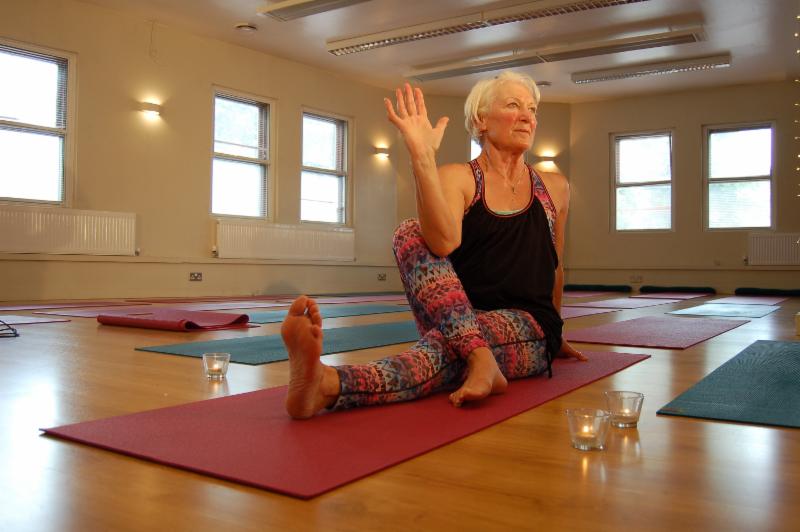“When I come to Barefoot I look around at everyone in the studio; everyone seems well, everyone is good. But statistically speaking, I’m not the only one here who’s had trouble or is struggling with something in some shape or another.” Liz Donaldson, 66, brimming with vitality. She practices yoga 3-4 times a week. She’s the upbeat, adventure-raising nan to her 7 (soon to be 8!) grandchildren. She loves coming up with new ideas for her garden, where she and her husband spend countless happy hours tending to the flowers and vegetables.
Liz was 54 years old when she was diagnosed with breast cancer. As a young nursing student, she’d been on a course where the facilitator made a killer introduction with a lasting impression: “1 in 7 of you will develop breast cancer.” When she discovered the pea-sized lump in her breast in March 2004, it was her worst fear coming to life.
The next two weeks after diagnosis were a rollercoaster of emotions, hospital visits, tests, surgery. She underwent a lumpectomy and removal of the lymph nodes. All the things she enjoyed doing, all of life as she knew it, put on hold – and without the slightest idea of how long it would last, or what would happen next.
The chemotherapy was administered in 3-week cycles over a period of 9 months. Before each round of treatment, they’d test her blood, bones; whether there was any resistance to the treatment, whether she was okay to proceed. “Every 3 weeks, needles, more needles. It was nerve-wracking waiting for the results. I never felt so exposed before, completely vulnerable. Raw. Every time, you can’t help think the worst is going to happen.”
The physical changes were happening so quickly that Liz no longer felt like her body was hers. Loss of hair, of muscle tone and strength. “The weirdest part was the hair, it comes out in clumps. So you end up with tufts sticking out, like a penguin – it was bizzare. My husband sleeps with the duvet over his head, when I started losing my hair I finally understood why. It does get pretty chilly up there with no hair cover!”
One year post-treatment, the hair had grown back. But a worse ordeal was about to begin. Liz’s eldest daughter was diagnosed with BRCA1 gene mutation. The gene is responsible for repairing DNA in cells. The mutation meant increased risk of breast cancer – 58% of those with the mutation will develop breast cancer by age 70 years. Of Liz’s 4 other daughters, her second, and the youngest, were also diagnosed. Each made the decision to undergo preventive surgery, hysterectomy and mastectomy. “It happened to me, and I could bear it. But for it to happen to my girls, that was unbearable.”
There were 3 things that she felt carried her through: support of family and friends, laughter, and focus. “You have to laugh at the struggles. Because otherwise, you break, you cry. And you have to limit yourself to focuses. 3 weeks at a time, you just get through it. My eldest was getting married, so that was a focus too. One thing at a time,” says Liz. “My family was unbelievably supportive throughout treatment. My youngest daughter Alice was about to sit her GCSEs. She’d come along to all the treatments, sit next to me and revise. She just wanted to be there, I was so thankful for that presence.”
Going into the interview, I naively assumed that she’d tell me about how yoga was the panacea that helped her find peace in those tumultuous times. Instead, she says with a shrug: “Whenever the teacher says, ‘Let your mind rest’ I smile to myself, because it’s just not me. My brain won’t back off, it wants to keep going. Maybe that’s just how I am.”
In Liz’s fight for survival and preservation of not only her life, but also of her daughters’ and the rest of the family, there was no question of letting the mind rest. In her mind, the imperative was clear, focused and single-pointed – live. Keep living. “When you come out of treatment, it’s like you’re exposed all over again. You’re no longer protected by the regimes, the schedules of treatment. It’s all down to you. So yoga was one of the ways in which I felt some control. Looking after myself rather than doing nothing. And getting excited about things I could do, like headstands – which I couldn’t even do as a child!”
It’s been 10 years now since she’s spoken about the totality of her experience of those days in such detail. Her voice is quiet but emphatic: “Every day I wake up, and somewhere in my brain, in my ether, I say, ‘Thank you. THANK YOU.’”
It is our hope that telling Liz’s story will help anyone on a difficult path, whatever it is you may be dealing with. In her own words, “Go slowly, go carefully. But keep going. Nothing’s impossible.”
